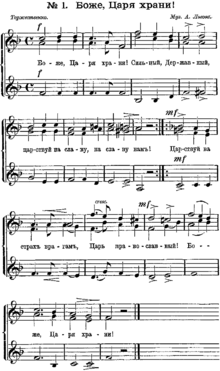God Save the Tsar!
| English: God Save the Tsar! | |
|---|---|
| Боже, Царя храни! | |
 | |
Former national anthem of Russia Former royal anthem of Bulgaria (1878–1908) | |
| Lyrics | Vasily Zhukovsky |
| Music | Alexei Lvov |
| Adopted | 31 December 1833 |
| Relinquished | 15 March 1917 |
| Preceded by | "The Prayer of Russians" |
| Succeeded by | "Worker's Marseillaise" |
| Audio sample | |
"God Save the Tsar!" (Боже, Царя храни!)
| |
"God Save the Tsar!" (Russian: Бо́же, Царя́ храни́!, tr. Bóže, Carjá hraní!, IPA: [ˈboʐɨ t͡sɐˈrʲa xrɐˈnʲi]) was the national anthem of the Russian Empire and, for a time, the national anthem of the Principality of Bulgaria. The song was chosen from a competition held in 1833 and was first performed on 18 December 1833. It was composed by violinist Alexei Lvov, with lyrics written by the court poet Vasily Zhukovsky. It was the anthem until the Russian Revolution of 1917, after which "Worker's Marseillaise" was adopted as the new national anthem until the overthrow of the Russian Provisional Government.
Lyrics[]
| Cyrillic script | Latin script | IPA transcription | Literal English translation | Poetic English translation |
|---|---|---|---|---|
Боже, Царя храни! |
Bože, Carja hrani! |
ˈboʐɨ, t͡sɐˈrʲæ xrɐˈnʲi |
God, save the Emperor, |

Influence[]
Many composers made use of the theme in their compositions, most notably Tchaikovsky, who quoted it in the 1812 Overture, the Marche Slave, his overture on the Danish national anthem, and the Festival Coronation March. During the Soviet era, authorities altered Tchaikovsky's music (such as the 1812 Overture and Marche Slave), substituting other patriotic melodies, such as the "Glory" chorus from Mikhail Glinka's opera A Life for the Tsar, for "God Save the Tsar".[1] Charles Gounod uses the theme in his Fantaisie sur l'Hymne National Russe (Fantasy on the Russian National Hymn). William Walton's score for the 1970 film Three Sisters, based on Chekhov's play, is dominated by the theme.
In 1842, English author Henry Chorley wrote "God, the Omnipotent!", set to Lvov's tune and published in 19th- and 20th-century hymnals as the Russian Hymn.[2] The Russian Hymn tune continues to appear in various modern English language hymnals, such as those of the United Methodist Church, the Presbyterian Church, the Lutheran Book of Worship of the Evangelical Lutheran Church in America, or as Russia in The Hymnal 1982 of the U.S. Episcopal Church.[3]
The same melody is also used with different lyrics for various institutional songs: Doxology of Phi Gamma Delta, "Noble Fraternity" of Phi Kappa Psi, West Chester University Alma Mater, Hail, Pennsylvania! (alma mater of the University of Pennsylvania),[4] Dear Old Macalester (alma mater of Macalester College),[5] Hail, Delta Upsilon (Delta Upsilon fraternity), Firm Bound in Brotherhood (official song of the Order of the Arrow),[6] the UST High School Hymn of the University of Santo Tomas High School in Manila,[7] and the alma mater of Texas Woman's University, Jesuit College Preparatory School of Dallas in Dallas, Texas, Westover School in Middlebury, Connecticut titled "Raise Now to Westover", Tabor Academy in Marion, Massachusetts, Dimmitt High School in Dimmitt, Texas, Grant High School in Portland, Oregon, Jesuit High School in Tampa, Florida and Windber Area High School in Windber, Pennsylvania.
Maurice Jarre's score for the film 1965 film Doctor Zhivago uses this song in several tracks, most notably in the Overture.
In 1998, singer-songwriter Alexander Gradsky, one of the best-known rock artists during the Soviet period, proposed using the song again as the Russian national anthem, but with substantially different lyrics from those originally written by Zhukovsky.[8]
Usage in Bulgaria[]
The composition was used as the royal anthem of the Principality of Bulgaria, having been imposed by the temporary Russian government and the Russian army commanders. The usage of it in Bulgaria was relinquished after the Bulgarian Declaration of Independence in 1908.[9]
References[]
- ^ "Aftershocks of 1812: Nationalism and Censorship in Tchaikovsky's 1812 Overture". 13 May 2014. Retrieved 14 November 2014.
- ^ The Hymnal 1982. New York: Episcopal Church Publishing. 1985. p. 569.
- ^ The Methodist Hymnal. Nashville, Tennessee: The Methodist Publishing House. 1966. p. 544.
- ^ Hail Pennsylvania - Acapella Performance https://www.youtube.com/watch?v=axioaLyZP9o
- ^ Dear Old Macalester - https://www.youtube.com/watch?v=Y13-e2iEcbs
- ^ Piano Performance of Firm Bound in Brotherhood - https://www.youtube.com/watch?v=MHae1qWj5RI
- ^ UST Hymn - Instrumental Guitar https://www.youtube.com/watch?v=n-ElH_t7ILg
- ^ Alexander Gradsky Official Website - https://alexandergradsky.com/publication/s00_24.shtml
- ^ "Химнът на България през превратностите на времето". socbg.com. Retrieved 26 July 2018.
External links[]
| Russian Wikisource has original text related to this article: |
| Wikisource has original text related to this article: |
- Russian Anthem Museum (in English) [1] (in Russian)
- National Anthem Info
- Brandenburg Historica (C) 2014. "Military Music and Tradition in Imperial Russia, 1700-1917". Updated 22 August 2014.
- „God Save the Tsar!“ in the House of the Union
- Historical national anthems
- Russian anthems
- Royal anthems
- National anthem compositions in F major
- National anthem compositions in C major
- National anthem compositions in A major
- God in culture

